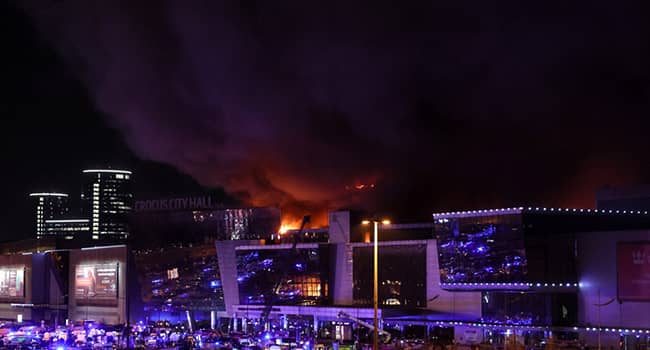Russia stated it had apprehended 11 individuals, including four gunmen, in connection with the assault on a Moscow concert hall that was claimed by the Islamic State. The death count has now reached 115.
Russian President Vladimir Putin has not yet publicly addressed the attack, and Moscow has not acknowledged the Islamic State's claim, despite some legislators suggesting a possible Ukraine link.
Gunmen in camouflage opened fire at the crowded Crocus City Hall in Moscow's northern suburb of Krasnogorsk on Friday evening before a concert by Soviet-era rock band Piknik. This is the deadliest attack in Russia in at least ten years.
Russia's FSB security service mentioned that some of the attackers had fled towards the Russia-Ukraine border, and that they had 'appropriate contacts' in the country.
The FSB did not provide additional details.
Certain Russian lawmakers also indicated Kyiv as a potential link, but without presenting evidence.
Senior Russian MP Andrey Kartapolov mentioned, 'The main interested party could most likely be Ukraine and its patrons… we can't rule it out'.
A statement by presidential aide Mykhailo Podolyak on Telegram proclaimed that Ukraine, which has been confronting a Russian military offensive for the past two years, was not involved in the attack.
The Kremlin informed President Vladimir Putin about the arrests made by the head of the FSB security service. Authorities cautioned that the death toll was expected to climb, with over 100 still in hospitals and ongoing efforts to search the burned-out venue.
According to a statement, 'FSB Director Alexander Bortnikov reported to the president on the detention of 11 individuals, including four terrorists involved in the terrorist attack at Crocus City Hall'.
Putin has not made any public statements or appeared in public in over 12 hours since the attack took place.
The Kremlin stated that he was constantly being updated and a government official mentioned that he had expressed hope for the victims' speedy recovery.
At least 115 people have been killed
Russia's Investigative Committee, which investigates major crimes, reported that rescue workers were still on site, recovering bodies from the building.
In a statement on Telegram, it was said, 'The emergency services have discovered additional bodies while clearing the debris. The death toll now stands at 115 people'.
The governor of the Moscow region stated that the number of fatalities was likely to rise further, as rescuers planned to continue searching the site for 'several days'.
Investigators mentioned that people died from both gunshot wounds and smoke inhalation after a fire engulfed the 6,000-seater venue.
The Investigative Committee stated, 'The terrorists used a flammable substance to ignite the concert hall's premises, where spectators, including the injured, were present'.
Following reports of the mass shooting on Friday, flames quickly spread through the venue, with terrified concert-goers rushing to emergency exits.
Footage shared on social media showed some individuals filming the gunmen from upper levels as they systematically walked through the stalls, shooting people.
The Islamic State group asserted responsibility on Friday, stating that its fighters attacked 'a large gathering' on the outskirts of Moscow and 'retreated to their bases safely'.
Widespread disapproval
Russian authorities have labeled it as a “terrorist attack”, but have not responded to the Islamic State’s assertion.
Around 107 individuals were still receiving medical treatment on Saturday morning, as reported by Russia’s Emergency Situations Ministry.
Russian Telegram channels, including Baza which has close ties to the security services, and a lawmaker stated that some of the suspects were from the central Asian nation of Tajikistan.
Tajikistan’s foreign affairs ministry stated that it had not been informed by Moscow about the alleged involvement of its citizens.
In Moscow, citizens formed long lines in the Saturday morning rain to donate blood, according to videos shared by state media outlets.
According to the RIA Novosti state agency, memorial posters displaying a single candle were put up at some Moscow bus stops instead of advertising billboards.
Various major events were canceled across the country, including a friendly football match between Russia and Paraguay scheduled to take place in Moscow on Monday.
Expressions of disapproval from world leaders kept coming in.
On Saturday, a spokesperson for Afghanistan’s foreign ministry stated that the Taliban “strongly condemns the recent terrorist attack in Moscow, Russia … and views it as a clear violation of all human standards.”
US warning disregarded
Attention is also being directed toward Russia’s powerful intelligence services following the attack.
Just three days earlier, Putin had publicly dismissed Western warnings of an imminent attack in Moscow as propaganda intended to frighten Russian citizens.
On 7 March, the US embassy in Russia had issued a security alert stating it was “monitoring reports that extremists have imminent plans to target large gatherings in Moscow, including concerts.”
Washington stated it had directly alerted Russian authorities about a “planned terrorist attack” potentially targeting “large gatherings” in Moscow.
The United States had “shared this information with Russian authorities,” National Security Council spokeswoman Adrienne Watson said.
However, during a meeting with FSB chiefs last Tuesday, Putin remarked: “Recent provocative statements by a number of official Westerns structures about the possibility of terrorist attacks in Russia … resembles outright blackmail and an intention to intimidate and destabilise our society.”
Earlier in March, the FSB stated that it had eliminated Islamic State militants who were planning an attack on a Moscow synagogue.
In recent weeks the agency has announced almost daily the arrest of several pro-Ukrainian saboteurs it claimed were plotting attacks on Russian military infrastructure.
AFP



